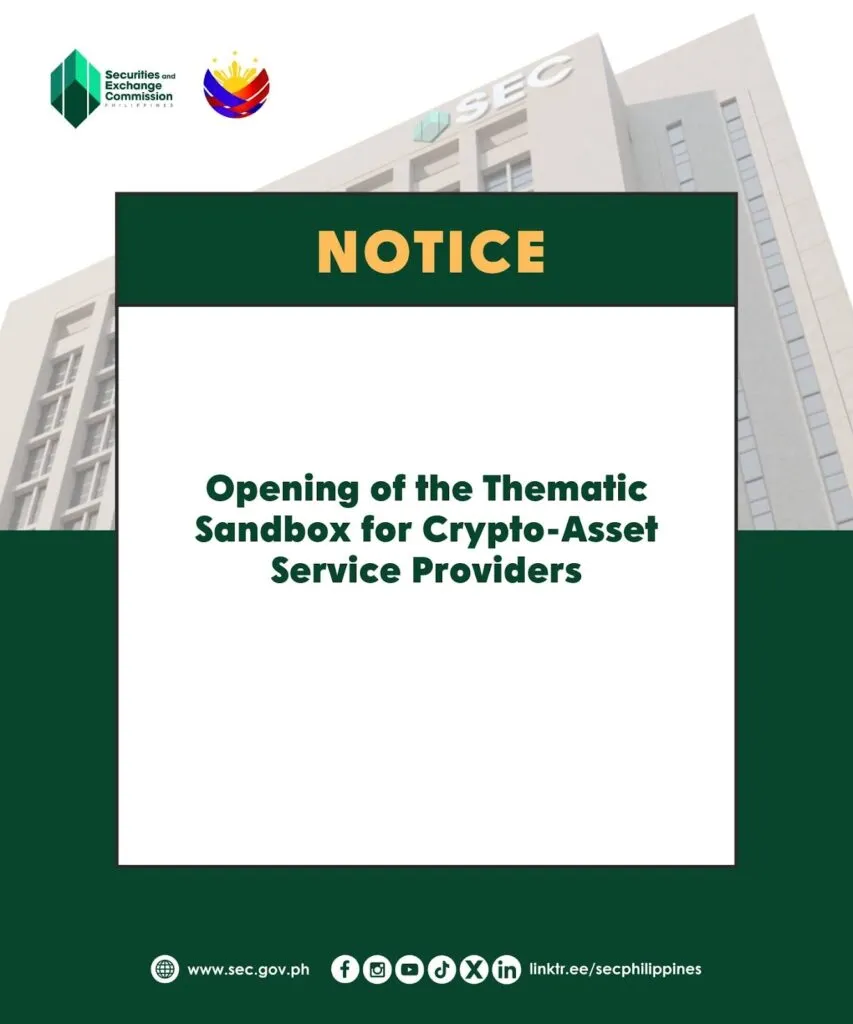The Securities and Exchange Commission (SEC) of the Philippines has officially opened applications for its Strategic Sandbox (StratBox), a regulatory program tailored for Crypto-Asset Service Providers (CASPs). Announced through SEC Memorandum Circular No. 09-2024, the StratBox initiative is designed to provide a supervised environment for testing innovative digital currency-related services to shape future regulations in the sector.
“The Commission hereby requests all interested parties to take note of the ‘SEC Strategic Sandbox (StratBox) for Crypto-Asset Service Providers (CASPs),'” the SEC stated in its official notice dated April 11, 2025.
The program is targeted at entities operating or intending to operate in the digital asset space, including digital currency exchanges, virtual asset custodians, and related service providers. However, the SEC clarified that applications from entities in other financial sectors will also be considered.
Controlled testing to inform policy development
 Source: Securities and Exchange Commission Philippines/Facebook
Source: Securities and Exchange Commission Philippines/FacebookThe sandbox will allow participants to trial new services, technologies, and business models in a live but controlled setting, enabling the SEC to observe and evaluate emerging risks and opportunities.
According to the notice, one of the core objectives of StratBox is to “provide a controlled and supervised environment where Crypto-Asset Service Providers can test and pilot their products, services, and business models.”
The program also seeks to “gather critical insights and data on the risks and opportunities associated with Crypto-Asset Services and their providers,” the SEC stated, noting that this information will be “instrumental in drafting comprehensive and effective SEC Rules and Guidelines on Crypto-Asset Service Providers.”
Balancing innovation with investor protection
While the sandbox encourages innovation, the SEC emphasized that consumer and investor protection remain top priorities. “To ensure that innovation is balanced with robust investor protection measures,” the sandbox will monitor activities to maintain both “market integrity and financial stability,” the SEC explained.
This move reflects the Commission’s broader mandate under the Securities Regulation Code to foster a competitive and secure financial market. According to the notice, the SEC “may grant regulatory reliefs to sandbox participants by modifying or replacing specific licensing, registration, compliance, or other regulatory requirements that may otherwise apply, during the sandbox period.”
Interested participants must complete the SEC StratBox Application Form, which is included as an annex to the circular. All completed applications and required documentation should be submitted electronically to the PhiliFintech Innovation Office. “The SEC encourages all eligible and interested parties to take advantage of this opportunity to participate in the StratBox and contribute to the development of a sound regulatory environment for Crypto-Asset Services in the Philippines,” the Commission stated.
A step towards comprehensive crypto regulation
The StratBox is part of the SEC’s broader efforts to regulate the country’s growing digital currency industry. In December 2024, the Commission released a draft regulatory framework, “SEC Rules on Crypto-Asset Service Providers (CASP Rules),” inviting public feedback.
Under the proposed rules, all digital currency firms must register with the SEC and obtain a CASP license to operate in the Philippines. Other requirements include incorporation as a stock corporation, employing at least four resident staff, compliance with cybersecurity standards, and maintaining minimum capital thresholds.
CASPs would also be subject to periodic audits and have to align their operations with the National Cybersecurity Plan to manage risks such as money laundering and hacking.
The draft also outlined rules for public crypto-asset offerings, requiring firms to submit disclosure documents 30 days before any sale. These documents must include detailed information about the issuer, technology, and potential risks.
Broader ecosystem developments in the Philippines
The sandbox program follows closely on the heels of other digital currency-related initiatives in the country. Earlier this year, a consortium of Philippine banks, led by Singapore-based Just Finance, launched a peso-backed stablecoin called PHPX to enhance cross-border payments and promote financial inclusion. The project involves UnionBank of the Philippines, Rizal Commercial Banking Corporation (RCBC), Cantilan Bank, and the Rural Bank of Guinobatan.
The stablecoin, which is backed 1:1 by the Philippine peso and built on the Hedera decentralized ledger platform, is set for release between May and July 2025. The initiative had been previously approved for controlled trials by the Bangko Sentral ng Pilipinas (BSP).
These developments point to an accelerating digital finance environment in the Philippines, with the central bank and the SEC adopting frameworks to manage the transition.
SEC reinforces the call for collaborative innovation
The SEC sees the StratBox as an important step in achieving a balanced regulatory approach. While innovation is key to the financial sector’s evolution, the Commission clarifies that proper oversight is essential.
The Commission reiterated, “This initiative is conducted in accordance with SEC Memorandum Circular No. 09-2024 to encourage competitiveness in the market through promulgation of rules for registration and licensing innovative and other trading markets.”
Watch | The Philippines startup boom: Highlights from Sinigang Valley Build Startup Festival
















 English (US) ·
English (US) ·